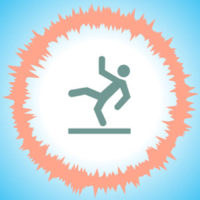Winning Florida Slip & Fall Cases

Slip and fall cases are very common, especially in places like Florida that have a high percentage of elderly residents, though it is certainly not only the elderly who may be victimized. The average person may think that it is easy to prevail on such a case, given that a business should, at least in theory, keep their premises safe at all times. However, in Florida, the law is structured in such a way where a plaintiff is much less likely to prevail on such a claim, though it is not impossible.
What’s Your Status?
Even if a plaintiff is able to demonstrate that a defendant had actual or constructive knowledge of some hazard on the floor of their establishment, they may fail to hold that defendant liable depending on their status with regard to premises liability cases. Florida’s slip and fall statute states that it does not affect any “common-law duty of care” owed by a person or entity in control of a business, meaning that a business owner still generally has a duty to try and make their premises safe. At common law, there are three classes of people, each of which is owed a different duty of care, later codified into case law:
- Invitees, who are owed the highest duty of care. A customer in a business would be classified as an invitee, and for them, a business owner must actively try to make their premises safe, and where they cannot, they must appropriately warn of potential dangers.
- Licensees, who are owed a middling duty of care. An example would be someone who entered a business simply to ask for directions or use a restroom. They are not owed any affirmative duty to make the property safe, but they are still entitled to adequate warning of any dangers.
- Trespassers, who are only entitled to not be deliberately harmed by the landowner. They are owed no duty, since they are not on the land with the owner’s permission.
Customers in businesses are generally invitees, which means at common law, a business does have a duty to make their premises safe or warn appropriately. Depending on the specific facts in your case, this apparent contradiction may bring up some interesting questions in court.
Statute Establishes A Burden
Perhaps most importantly, Florida’s statute governing slip and fall cases explicitly places the burden of proof on the plaintiff, where before its passage, at least part of the burden fell upon the defendant. In a slip and fall case, a defendant used to have to prove that it had no knowledge, whether actual or constructive (that is, they did not know and had no duty to know), of any potential hazard on their floor. Now, the statute specifically states that it is the plaintiff who must show that the business had actual or constructive knowledge of any “transitory foreign substance” on their floor that someone may slip on.
Many plaintiffs (and their attorneys!) find the burden shift somewhat unfair, mostly because a plaintiff is simply not on the premises for long enough, in many cases, to be able to establish that the defendant business had any knowledge of the ‘transitory foreign substance’ on the floor. If someone is on the premises only long enough to, say, take one item off the shelf and go to pay for it, they have no ability to show that the business knew anything – but to punish them for the happenstance of their being present for such a short time seems, at the very least, inequitable.
Contact A Tampa Injury Lawyer
While slip and fall cases are difficult to win, it is very possible to do so if the presentation is good. The Tampa personal injury lawyers at the Rinaldo Law Group can sit down with you and try to determine the best way to move forward with your case, as well as answering any questions you may have. Call us at 813-831-9999 today for a free consultation.
Resource:
leg.state.fl.us/Statutes/index.cfm?App_mode=Display_Statute&URL=0700-0799/0768/Sections/0768.0755.html












